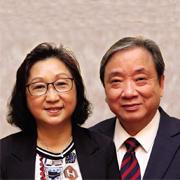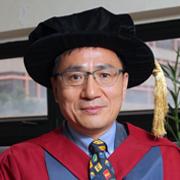
中文
In 2005, the University celebrated the inauguration of the first 8 Endowed Professorships,
a milestone in the University's history.
To date, a total of 120 Endowed Professorships have been established.
a milestone in the University's history.
To date, a total of 120 Endowed Professorships have been established.

 |
Norman and Cecilia Yip Professorship in Bioinorganic Chemistry We established this Endowed Professorship in celebration of the Faculty of Science’s 80th anniversary. Chemistry changed our lives and studying it, in particular, taught me the keys to thinking and action. We hope this Professorship will be the catalyst for even greater outcomes in the study of bioinorganic chemistry.
Norman and Cecilia Yip |
 |
Sun HongzheAppointed in 2019 Bioinorganic chemistry is the study of the structures and biological functions of inorganic biological substances, that is, those not containing carbon, such as metals. Essentially, it is a field of science that examines the role of metals in biology. In recent years the field of bioinorganic chemistry has grown significantly and is now one of the major sub-disciplines of inorganic chemistry. It has also entered other areas of the life sciences due to its highly interdisciplinary nature. In particular, bioinorganic chemistry is key to investigating the links between inorganic elements and genomic information. Professor Sun Hongzhe is Chair of Chemistry at the Department of Chemistry, The University of Hong Kong (HKU), and is also the Norman and Cecilia Yip Professor in Bioinorganic Chemistry. Professor Sun’s research interests lie in the frontier of inorganic chemistry and biology, and medicine. He has recently focused on the structural biology of metallo-proteins, and on metallomics and metalloproteomics. By using chemical biology and metallomic approaches, his research team has identified several key metallo-drug binding proteins and characterised selected metallo-transport and storage proteins in microorganisms that provide a basis for mechanism-based drug design. The increasing complexity of the problems scientists are trying to solve requires the spirit of collaboration and Professor Sun credits teamwork as the formula for success in producing high impact research. Just last year, a research team led by Professor Sun made a medical breakthrough in developing a drug that can be used to paralyse multi-resistant superbugs. This came after the team discovered that colloidal bismuth subcitrate, a common drug used to treat Helicobacter pylori-related ulcers, could effectively stop superbugs that can cause deadly infections such as bacteremia, pneumonia and wound infections. As part of the research, the team found that colloidal bismuth subcitrate can also significantly suppress the development of antibiotic resistance, allowing the lifespan of currently-used antibiotics to be extended. The drug allows dosages of antibiotics to be reduced by 90 percent to attain the same level of effectiveness. Drug-resistant infections kill about 700,000 people worldwide each year. The findings were published in Nature Communications and Professor Sun has since been granted a US patent. He received his PhD from the University of London (Birkbeck) in 1996. After two years as a Research Fellow at the University of Edinburgh, he joined the Department of Chemistry at HKU as an Assistant Professor and was promoted to Professor in 2007. Professor Sun was the recipient of a Croucher Senior Research Fellowship (2010-11), a WuXi AppTech Life Science & Chemistry Research Award (2016), and the UC Berkeley Muetterties Lectureship (2018) in recognition of his pioneering work on metalloproteomics and drug discovery. He has been the series editor of Metallobiology (published by the Royal Society of Chemistry) since 2010 and has served on the editorial boards of several scientific journals including Metallomics, the Journal of Biological Inorganic Chemistry and BioMetals, and has edited a book entitled Biological Chemistry of Arsenic, Antimony and Bismuth (2011). Professor Sun has also been Chair of the Steering Committee of Asian Biological Inorganic Chemistry since 2006. |